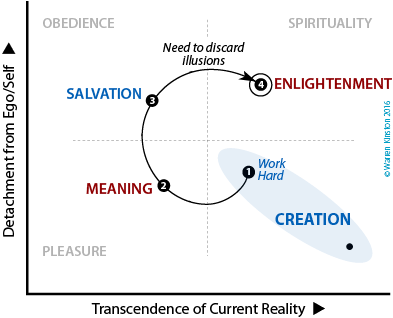Stage-4: Enlightenment — Be Philosophical
Rationale

is not simply about dealing with immediate economic (), personal () and relational () challenges. It is about handling the wider environment, indeed the entire cosmos. Unfortunately, the cosmos has no interest in our well-being.
At this point in the strengthening of coping, it becomes only too evident that we know little (in comparison to what can be known) and we can do little (in comparison to what needs to be done). Because coping requires us to maintain our balance and continue positively despite this, the values and principles within the provide the way forward.
focuses attention on yourself once more. The emphasis here is on obtaining and maintaining an inner equilibrium in the face of distressing events and intense inner emotions.
Refusal to Face Reality is a Failure in Coping
is one of the mantras of self-control for inner strength in the framework of producing goodness.
Avoiding reality means living with illusory hopes and even delusions. The gratification from such fantasies can be intense. It can be said that creation of an imaginary world is a way of coping, but it usually interferes with constructive coping.
However, a person who creates far-fetched conspiracy theories or is unable to say “it is what it is” in regard to an unpleasant realities is likely to rage against the world. This view that the cosmos is intrinsically sinister is not an effective coping method: it potentially leads to more stress and even violence.
Values & Assumptions
Promoting Survival:
Essence: Be philosophical
Being philosophical is about recognizing that much if not most of what affects our lives and happiness is both beyond comprehension and beyond remedying. Because we cannot control our environment, passively reacting to events is equivalent to giving up. What we can control is ourselves, and that primarily means controlling the way we think about events and what we do as a response. There is especially a need to master our expectations and our wishes.
Benefit: Develop calmness
Being philosophical does not mean ignoring avoiding or rejecting emotions. But it does oppose raging against the supposed unfairness of society or human existence. While the natural urge when events do not go our way may be to blame and to complain, this is to over-personalize and to emotionalize matter. It is far more productive to banish emotional storms and maintain a rational outlook. Equanimity protects your energies.
Means: Abandon comforting illusions
Most frustration and distress about matters beyond our control is generated by illusions, or even delusions that are held because they provide a superficial comfort. By discarding illusions we can address reality, and we avoid the emotional storms that arise when such false ideas are punctured by events.
► Review some common seductive illusions listed as primal delusions.
Handling the Socio-physical Environment:
Participation: Reject anxiety and futility
Hoping for the best while preparing for the worst can be described as optimistic, pessimistic, or realistic. When with others, fostering morale supports group cohesion and effectiveness. Morale is damaged by expressions of futility and depressive ideation and raised by realism infused with and . So, while fear in dangerous situations is appropriate, anxiety is unhelpful; and while situations may be unmanageable, experiencing futility is counter-productive.
Interaction: Tolerate differences of view
Every person is unique. So members of any group will have a diversity of views and feelings. These differences may be reconcilable, but not always. As a result, a group may cohere or divide. By being ready to tolerate differences of view, rather than asserting the correctness of your own view, you maximize the chance of cohesion and member cooperation.
Individualization: Adhere to virtues
The philosophical position would hold that at all times you are strengthened by being virtuous. The four cardinal virtues from antiquity are: prudence, justice (fairness), moderation (temperance), and courage (fortitude). To these we may add integrity, benevolence and wisdom, which completes the set listed in the . The three theological virtues—faith, hope charity—can also be included.
Channeling Your Functioning:
Endurance: based on Accepting
Accepting the cosmos as it is remains the fundamental requirement. is one of the mantras of self-control for inner strength in the framework of producing goodness. The biggest challenge comes when you must «accept the unacceptable».
Limitations
At this point, we have completed Cycle-1 and got the maximum control over our entanglement with psychosocial reality. It might seem that there is no need to proceed beyond Stage-4. However, this would be to ignore the realities of living.
The more we do, the more we are asked to do. Troubles never come alone. Consequences of a simple mistake can multiply. Crucial persons in our support system may leave or fall ill. In these situations, our inner reservoirs of psychic energy become depleted. No matter how philosophical, accepting and positive, we start to feel exhausted. This is the beginning of a potential burn-out. It is essential to prevent burn-out before it ever seems to be emerging.
Cycle-2 is therefore about managing the silent build-up of stresses that develop when coping well. But before entering Cycle-2, we must complete Cycle-1 by re-entering the .
Moving on…..
- Re-enter Creation Mode-μ1.
Originally posted: 9-Dec-2022. Last updated: 28-Mar-2023.